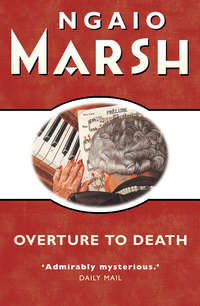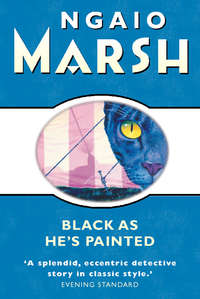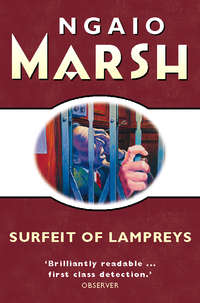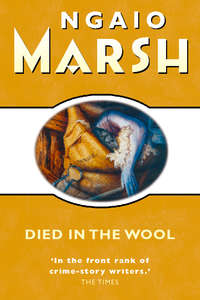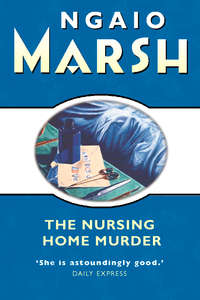
Полная версия
Dead Water
There was a dead silence during which, Jenny thought, everyone listened nervously for asthmatic manifestations from Miss Cost’s chest. There were none.
‘Miss Cost,’ said Patrick Ferrier at last. ‘How perfectly splendid!’ There were general ambiguous murmurs of congratulation. Major Barrimore, looking as if he would like to exchange a wink with somebody, added: ‘Long may it last!’ They were all rather taken aback by the fervency with which she ejaculated. ‘Amen! Yes, indeed. Amen!’ The Rector looked extremely uncomfortable. Dr Maine asked Miss Cost if she’d seen any green ladies while she was about it.
‘N-n-o!’ she said and darted a very unfriendly glance at him.
‘You sound as if you’re not sure of that, Miss Cost.’
‘My eyes were closed,’ she said quickly.
‘I see,’ said Dr Maine.
The restless young man who had been biting at his nails said loudly: ‘Look!’ and having engaged their general attention, declared himself. ‘Look!’ he repeated, ‘I’d better come clean and explain at once that I take a – well, a professional interest in all this. On holiday: but a news-hound’s job’s never done, is it? It seems to me there’s quite a story here. I’m sure my paper would want our readers to hear about it. The London Sun and I’m Kenneth Joyce. “K.J.’s Column.” You know? “What’s The Answer?” Now, what do you all say? Just a news item. Nothing spectacular.’
‘O, no!’ Mrs Barrimore ejaculated and then added: ‘I’m sorry. It’s simply that I really do so dislike that sort of thing.’
‘Couldn’t agree more,’ said Dr Maine. For a second they looked at each other.
‘I really think,’ the Rector said, ‘not. I’m afraid I dislike it too, Mr Joyce.’
‘So do I,’ Jenny said.
‘Do you?’ asked Mr Joyce. ‘I’m sorry about that. I was going to ask if you’d lend me this picture. It’d blow up quite nicely. My paper would pay –’
‘No,’ said Jenny.
‘Golly, how fierce!’ said Mr Joyce, pretending to shrink. He looked about him. ‘Now why not?’ he asked.
Major Barrimore said: ‘I don’t know why not. I can’t say I see anything wrong with it. The thing’s happened, hasn’t it, and it’s damned interesting. Why shouldn’t people hear about it?’
‘O, I do agree,’ cried Miss Cost. ‘I’m sorry but I do so agree with the Major. When the papers are full of such dreadful things shouldn’t we welcome a lovely, lovely true story like Wally’s. O, yes!’
Patrick said to Mr Joyce: ‘Well, at least you declared yourself,’ and grinned at him.
‘He wanted Jenny’s photograph,’ said Mrs Barrimore quietly. ‘So he had to.’
They looked at her with astonishment. ‘Well, honestly, Mama!’ Patrick ejaculated. ‘What a very crisp remark!’
‘An extremely cogent remark,’ said Dr Maine.
‘I don’t think so,’ Major Barrimore said loudly and Jenny was aware of an antagonism that had nothing to do with the matter under discussion.
‘But, of course I had to,’ Mr Joyce conceded with a wide gesture and an air of candour. ‘You’re dead right. I did want the photograph. All the same, it’s a matter of professional etiquette, you know. My paper doesn’t believe in pulling fast ones. That’s not The Sun’s policy, at all. In proof of which I shall retire gracefully upon a divided house.’
He carried his drink over to Miss Cost and sat beside her. Mrs Barrimore got up and moved away. Dr Maine took her empty glass and put it on the bar.
There was an uncomfortable silence, induced perhaps by the general recollection that they had all drunk at Mr Joyce’s expense and a suspicion that his hospitality had not been offered entirely without motive.
Mrs Barrimore said: ‘Good night, everybody,’ and went out.
Patrick moved over to Jenny. ‘I’m going fishing in the morning if it’s fine,’ he said. ‘Seeing it’s a Saturday, would it amuse you to come? It’s a small, filthy boat and I don’t expect to catch anything.’
‘What time?’
‘Dawn. Or soon after. Say half past four.’
‘Crikey! Well, yes, I’d love to if I can wake myself up.’
‘I’ll scratch on your door like one of the Sun King’s courtiers. Which door is it? Frightening, if I scratched on Miss Cost’s!’
Jenny told him. ‘Look at Miss Cost now,’ she said. ‘She’s having a whale of a time with Mr Joyce.’
‘He’s getting a story from her.’
‘O, no!’
‘O, yes! And tomorrow, betimes, he’ll be hunting up Wally and his unspeakable parents. With a camera.’
‘He won’t!’
‘Of course he will. If they’re sober they’ll be enchanted. Watch out for K.J.’s “What’s The Answer” column in The Sun.’
‘I do think the gutter-press in this country’s the rock bottom.’
‘Don’t you have a gutter-press in New Zealand?’
‘Not as low.’
‘Well done, you. All the same, I don’t see why K.J.’s idea strikes you as being so very low. No sex. No drugs. No crime. It’s as clean as a whistle, like Wally’s hands.’ He was looking rather intently into Jenny’s face. ‘Sorry,’ he said. ‘You didn’t like that, either, did you?’
‘It’s just – I don’t know, or yes, I think I do. Wally’s so vulnerable. I mean, he’s been jeered at and cowed by the other children. He’s been puzzled and lonely and now he’s a comparatively happy little creature. Quite a hero, in a way. He’s not attractive: his sort aren’t, as a rule, but I’ve got an affection for him. Whatever’s happened ought to be private to him.’
‘But he won’t take it in, will he? All the ballyhoo, if there is any ballyhoo? He may even vaguely enjoy it.’
‘I don’t want him to. All right,’ Jenny said crossly, ‘I’m being bloody-minded. Forget it. P’raps it won’t happen.’
‘I think you may depend upon it,’ Patrick rejoined. ‘It will.’
And, in the event, he turned out to be right.
IV
WHAT’S THE ANSWER?
Do You Believe in Fairies?
Wally Trehern does. Small boy of Portcarrow Island had crop of warts that made life a misery.
Other Kids Shunned Him Because of his Disfigurement. So Wally washed his hands in the Pixie Falls and – you’ve guessed it.
This is what they looked like before.
And here they are now.
Wally, seen above with parents, by Pixie Falls, says mysterious green lady ‘told me to wash them off’.
Parents say no other treatment given.
Miss Elspeth Cost (inset) cured of chronic asthma?
Local doctor declines comment.
(Full story on Page 9.)
Dr Maine read the full story, gave an ambiguous ejaculation and started on his morning round.
The Convalescent Home was a very small one: six single rooms for patients, and living quarters for two nurses and for Dr Maine who was a widower. A veranda at the back of the house looked across a large garden and an adjacent field towards the sea and the Island.
At present he had four patients, all convalescent. One of them, an elderly lady, was already up and taking the air on the veranda. He noticed that she, like the others, had been reading The Sun.
‘Well, Mrs Thorpe,’ he said, bending over her, ‘this is a step forward, isn’t it? If you go on behaving nicely we’ll soon have you taking that little drive.’
Mrs Thorpe wanly smiled and nodded. ‘So unspoiled,’ she said waving a hand at the prospect. ‘Not many places left like it. No horrid trippers.’
He sat down beside her, laid his fingers on her pulse and looked at his watch. ‘This is becoming pure routine,’ he said cheerfully.
It was obvious that Mrs Thorpe had a great deal more to say. She scarcely waited for him to snap his watch shut before she began.
‘Dr Maine, have you seen The Sun?’
‘Very clearly. We’re in for a lovely day.’
She made a little dab at him. ‘Don’t be provoking! You know what I mean. The paper. Our news! The Island!’
‘Oh that. Yes, I saw that.’
‘Now, what do you think? Candidly. Do tell me.’
He answered her as he had answered Patrick Ferrier. One heard of such cases. Medically there could be no comment.
‘But you don’t pooh-pooh?’
No, no. He didn’t altogether do that. And now he really must –
As he moved away she said thoughtfully, ‘My little nephew is dreadfully afflicted. They are such an eyesore, aren’t they? And infectious, it’s thought. One can’t help wondering –’
His other patients were full of the news. One of them had a first cousin who suffered abominably from chronic asthma.
Miss Cost read it over and over again: especially the bit on page nine where it said what a martyr she’d been and how she had perfect faith in the waters. She didn’t remember calling them the Pixie Falls but now she came to think of it, the name was pretty. She wished she’d had time to do her hair before Mr Joyce’s friend had taken the snapshot and it would have been nicer if her mouth had been quite shut. But still. At low tide she strolled over to the newsagent’s shop in the village. All their copies of The Sun, unfortunately, had been sold. There had been quite a demand. Miss Cost looked with a professional and disparaging eye at the shop. Nothing really at all in the way of souvenirs and the postcards were very limited. She bought three of the Island and covered the available space with fine writing. Her friend with arthritic hands would be interested.
V
Major Barrimore finished his coffee and replaced the cup with a slightly unsteady hand. His immaculately shaven jaws wore their morning purple tinge and his eyes were dull.
‘Hasn’t been long about it,’ he said, referring to his copy of The Sun. ‘Don’t waste much time, these paper wallahs. Only happened day-before-yesterday.’
He looked at his wife. ‘Well. Haven’t you read it? ‘he asked.
‘I looked at it.’
‘I don’t know what’s got into you. Why’ve you got your knife into this reporter chap? Decent enough fellah of his type.’
‘Yes, I expect he is.’
‘It’ll create a lot of interest. Enormous circulation. Bring people in, I wouldn’t wonder. Quite a bit about The Boy-and-Lobster.’ She didn’t answer and he suddenly shouted at her. ‘Damn it, Margaret, you’re about as cheerful as a dead fish. You’d think there’d been a death on the Island instead of a cure. God knows we could do with some extra custom.’
‘I’m sorry, Keith. I know.’
He turned his paper to the racing page. ‘Where’s that son of yours?’ he said presently.
‘He and Jenny Williams were going to row round as usual to South Bay.’
‘Getting very thick, aren’t they?’
‘Not alarmingly so. She’s a dear girl.’
‘If you can stomach the accent.’
‘Hers is not so very strong do you think?’
‘P’raps not. She’s a fine strapping filly, I will say. Damn’ good legs. Oughtn’t he to be swotting?’
‘He’s working quite hard, really.’
‘Of course you’d say so.’ He lit a cigarette and returned to the racing notes. The telephone rang.
‘I will,’ said Mrs Barrimore.
She picked up the receiver. ‘Boy-and-Lobster. Yes. Yes.’ There was a loud crackle and she said to her husband, ‘It’s from London.’
‘If it’s Mrs Winterbottom,’ said her husband, referring to his suzerain. ‘I’m out.’
After a moment or two the call came through. ‘Yes,’ she said. ‘Certainly. Yes, we can. A single room? May I have your name?’
There were two other long-distance calls during the day. By the end of the week the five rooms at The Boy-and-Lobster were all engaged.
A correspondence had got underway in The Sun on the subject of faith-healing and unexplained cures. On Friday there were inquiries from a regular television programme.
The school holidays had started and Jenny Williams had come to the end of her job at Portcarrow.
VI
While the Barrimores were engaged in their breakfast discussion, the Rector and Mrs Carstairs were occupied with the same topic. The tone of their conversation was, however, dissimilar.
‘There!’ Mr Carstairs said, smacking The Sun as it lay by his plate. ‘There! Wretched creature! He’s gone and done it!’
‘’T, yes, so he has. I saw. Now for the butcher,’ said Mrs Carstairs who was worrying through the monthly bills.
‘No, Dulcie, but it’s too much. I’m furious,’ said the Rector uncertainly. ‘I’m livid.’
‘Are you? Why? Because of the vulgarity or what? And what,’ Mrs Carstairs continued, ‘does Nankivell mean by saying “2 lbs bst fil.” when we never order fillet let alone best? Stewing steak at the utmost. He must be mad.’
‘It’s not only the vulgarity, Dulcie. It’s the effect on the village.’
‘What effect? And threepence ha’penny is twelve, two, four. It doesn’t even begin to make sense.’
‘It’s not that I don’t rejoice for the boy. I do. I rejoice like anything and remember it in my prayers.’
‘Of course you do,’ said his wife.
‘That’s my whole point. One should be grateful and not jump to conclusions.’
‘I shall speak to Nankivell. What conclusions?’
‘Some ass,’ said the Rector, ‘has put it into the Treherns’ heads that – O dear! – that there’s been a – a –’
‘Miracle?’
‘Don’t! One shouldn’t. It’s not a word to be bandied about. And they are bandying it about, those two.’
‘So much for Nankivell and his rawhide,’ she said, turning to the next bill. ‘No, dear, I’m sure it’s not. All the same it is rather wonderful.’
‘So are all recoveries. Witnesses to God’s mercy, my love.’
‘Were the Treherns drunk?’
‘Yes,’ he said shortly. ‘As owls. The Romans know how to deal with these things. Much more talk and we’ll be in need of a devil’s advocate.’
‘Don’t fuss,’ said Mrs Carstairs, ‘I expect it’ll all simmer down.’
‘I hae me doots,’ her husband darkly rejoined. ‘Yes, Dulcie. I hae me doots.’
VII
‘How big is the Island?’ Jenny asked, turning on her face to brown her back.
‘Teeny. Not more than fourteen acres, I should think.’
‘Who does it belong to?’
‘To an elderly lady called Mrs Fanny Winterbottom who is the widow of a hairpin king. He changed over to bobby-pins at the right moment and became a millionaire. The Island might be called his Folly.’
‘Pub and all?’
‘Pub and all. My mother,’ Patrick said, ‘has shares in the pub. She took it on when my step-father was axed out of the Army.’
‘It’s Heaven: the Island. Not too pretty. This bay might almost be at home. I’ll be sorry to go.’
‘Do you get homesick, Jenny?’
‘A bit. Sometimes. I miss the mountains and the way people think. All the same, it’s fun trying to get tuned-in. At first, I was all prickles and antipodean prejudice, belly-aching away about living-conditions like the Treherns’ cottage and hidebound attitudes and so on. But now –’ she squinted up at Patrick. ‘It’s funny,’ she said, ‘but I resent that rotten thing in the paper much more than you do and it’s not only because of Wally. It’s a kind of insult to the Island.’
‘It made me quite cross too, you know.’
‘English understatement. Typical example of.’
He gave her a light smack on the seat.
‘When I think,’ Jenny continued, working herself into a rage, ‘of how that brute winkled the school group out of the Treherns and when I think how he had the damned impertinence to put a ring round me –’
‘“Red-headed Jennifer Williams says warts were frightful”,’ Patrick quoted.
‘How he dared!’
‘It’s not red, actually. In the sun it’s copper. No, gold almost.’
‘Never you mind what it is. O Patrick –’
‘Don’t say “Ow Pettruck”.’
‘Shut up.’
‘Well, you asked me to stop you. And it is my name.’
‘All right. Ae-oh, Pe-ah-trick, then.’
‘What?’
‘Do you suppose it might lead to a ghastly invasion? People smothered in warts and whistling with asthma bearing down from all points of the compass?’
‘Charabancs.’
‘A Giffte Shoppe.’
‘Wire-netting round the spring.’
‘And a bob to get in.’
‘It’s a daunting picture,’ Patrick said. He picked up a stone and hurled it into the English Channel. ‘I suppose,’ he muttered, ‘it would be profitable.’
‘No doubt.’ Jenny turned to look at him and sat up. ‘Oh, no doubt,’ she repeated. ‘If that’s a consideration.’
‘My dear, virtuous Jenny, of course it’s a consideration. I don’t know whether, in your idyllic antipodes, you’ve come across the problem of constant hardupness. If you haven’t I can assure you it’s not much cop.’
‘Well, but I have. And, Patrick, I’m sorry. I didn’t know.’
‘I’ll forgive you. I’ll go further and tell you that unless things look up a bit at The Boy-and-Lobster or, alternatively, unless my step-father can be moved to close his account with his bookmaker and keep his hands off the whisky bottle you’ll be outstaying us on the Island.’
‘Patrick!’
‘I’m afraid so. And the gentlemen of the Inns of Court will be able to offer their dinners to some more worthy candidate. I shan’t eat them. I shall come down from Oxford and sell plastic combs from door to door. Will you buy one for your red-gold hair?’ Patrick began to throw stones as fast as he could pick them up. ‘It’s not only that,’ he said presently. ‘It’s my Mama. She’s in a pretty dim situation, anyway, but here, at least, she’s –’ He stood up. ‘Well, Jenny,’ he said. ‘There’s a sample of the English reticence that strikes you as being so comical.’ He walked down to the boat and hauled it an unnecessary inch or two up the beach.
Jenny felt helpless. She watched him and thought that he made a pleasing figure against the sea as he tugged back in the classic posture of controlled energy.
‘What am I to say to him?’ she wondered. ‘And does it matter what I say?’
He took their luncheon basket out of the boat and returned to her.
‘Sorry about all that,’ he said. ‘Shall we bathe before the tide changes and then eat? Come on.’
She followed him down to the sea and lost her sensation of inadequacy as she battled against the incoming tide. They swam, together and apart, until they were tired and then returned to the beach and had their luncheon. Patrick was well-mannered and attentive and asked her a great many questions about New Zealand and the job she hoped to get, teaching English in Paris. It was not until they had decided to row back to their own side of the Island and he had shipped his oars, that he returned to the subject that waited, Jenny felt sure, at the back of both their minds.
‘There’s the brow of the hill,’ he said. ‘Just above our beach. And below it on the far side, is the spring. Did you notice that Miss Cost, in her interview, talked about the Pixie Falls?’
‘I did. With nausea.’
He rowed round the point into Fisherman’s Bay.
‘Sentiment and expediency,’ he said, ‘are uneasy bedfellows. But, of course, it doesn’t arise. It’s quite safe to strike an attitude and say you’d rather sell plastic combs than see the prostitution of the place you love. There won’t be any upsurge of an affluent society on Portcarrow Island. It will stay like this – as we both admire it, Jenny. Only we shan’t be here to see. Two years from now and everybody will have forgotten about Wally Trehern’s warts.’
He could scarcely have been more at fault. Before two years had passed everybody in Great Britain who could read a newspaper knew all about Wally Trehern’s warts and because of them the Island had been transformed.
CHAPTER 2
Miss Emily
‘The trouble with my family,’ said Miss Emily Pride, speaking in exquisite French and transferring her gaze from Alleyn to some distant object, ‘is that they go too far.’
Her voice was pitched on the high didactic note she liked to employ for sustained narrative. The sound of it carried Alleyn back through time on a wave of nostalgia. Here he had sat, in this very room that was so much less changed than he or Miss Emily. Here, a candidate for the Diplomatic Service, he had pounded away at French irregular verbs and listened to entrancing scandals of the days when Miss Emily’s papa had been chaplain at our embassy in Paris. How old could she be now? Eighty? He pulled himself together and gave her his full attention.
‘My sister, Fanny Winterbottom,’ Miss Emily announced, ‘was not free from this fault. I recall an informal entertainment at our embassy in which she was invited to take part. It was a burlesque. Fanny was grotesquely attired and carried a vegetable bouquet. She was not without talent of a farouche sort and made something of a hit. Verb. sap.: as you shall hear. Inflamed by success she improvised a short equivocal speech at the end of which she flung her bouquet at H.E. It struck him in the diaphragm and might well have led to an incident.’
Miss Emily recalled her distant gaze and focused it upon Alleyn. ‘We are none of us free from this wild strain,’ she said, ‘but in my sister Fanny its manifestations were extreme. I cannot help but think there is a connection.’
‘Miss Emily, I don’t quite see what you mean.’
‘Then you are duller than your early promise led me to expect. Let me elaborate.’ This had always been an ominous threat with Miss Emily. She resumed her narrative style.
‘My sister Fanny,’ she said, ‘married. A Mr George Winterbottom who was profitably engaged in Trade. So much for him. He died, leaving her a childless widow with a more than respectable fortune. Included in her inheritance was the soi-disant island which I mentioned in my letter.’
‘Portcarrow?’
‘Precisely. You cannot be unaware of recent events on this otherwise characterless promontory.’
‘No, indeed.’
‘In that case I shall not elaborate. Suffice it to remind you that within the last two years there has arisen, fructified and flourished, a cult of which I entirely disapprove and which is the cause of my present concern and of my calling upon your advice.’
She paused. ‘Anything I can do, of course –’ Alleyn said.
‘Thank you. Your accent has deteriorated. To continue. Fanny, intemperate as ever, encouraged her tenants in their wart-claims. She visited the Island, interviewed the child in question, and, having at the time an infected outbreak on her thumb, plunged it in the spring whose extreme coldness possibly caused it to burst. It was no doubt ripe to do so but Fanny darted about talking of miracles. There were other cases of an equally hysterical character. The thing had caught on and my sister exploited it. The inn was enlarged, the spring was enclosed, advertisements appeared in the papers. A shop was erected on the Island. The residents, I understand, are making money hand-over-fist.’
‘I should imagine so.’
‘Very well. My sister Fanny (at the age of 87), has died. I have inherited her estates. I need hardly tell you that I refuse to countenance this unseemly charade, still less to profit by it.’
‘You propose to sell the place?’
‘Certainly not. Do,’ said Miss Emily sharply, ‘pull yourself together, Roderique. This is not what I expect of you.’
‘I beg your pardon, Miss Emily.’
She waved her hand. ‘To sell would be to profit by its spurious fame and allow this nonsense full play. No, I intend to restore the Island to its former state. I have instructed my solicitors to acquaint the persons concerned.’
‘I see,’ said Alleyn. He got up and stood looking down at his old tutoress. How completely Miss Emily had taken on the character of a certain type of elderly Frenchwoman. Her black clothes seemed to disclaim, clear-sightedly, all pretence to allure. Her complexion was grey: her jewellery of jet and gold. She wore a general air of disassociated fustiness. Her composure was absolute. The setting was perfectly consonant with the person: pieces of buhl; formal, upholstered, and therefore dingy, chairs; yellowing photographs, among which his own young, thin face stared back at him, and an unalterable arrangement of dyed pampas plumes in an elaborate vase. For Miss Emily, her room was absolutely comme-il-faut. Yes, after all, she must be –


